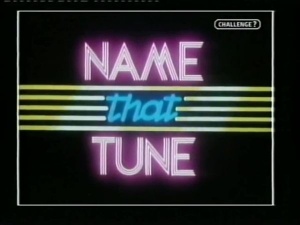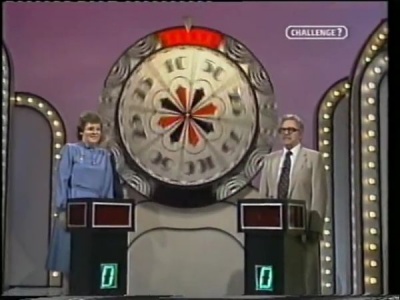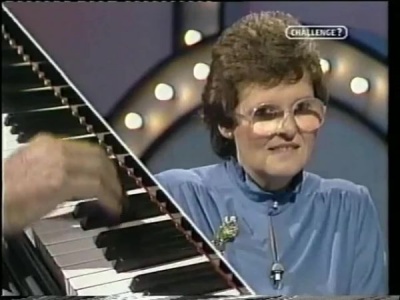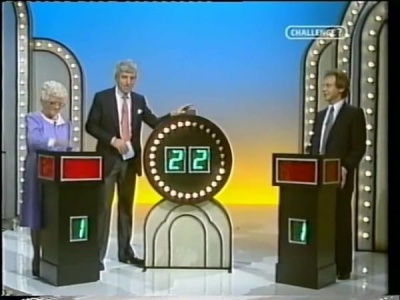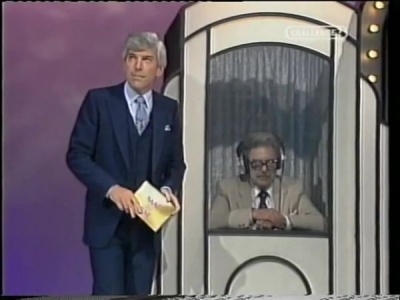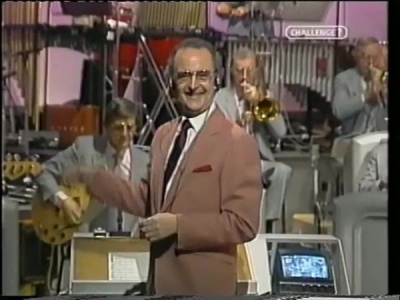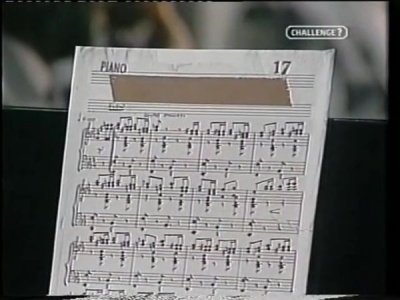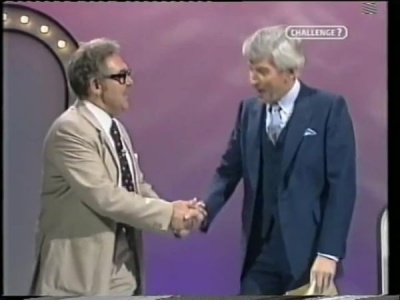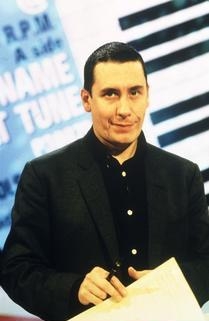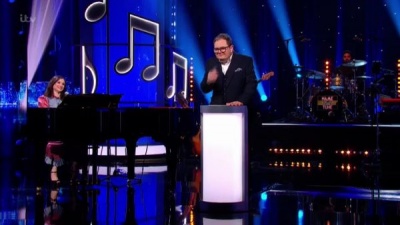Name That Tune
(→Host) |
(→Host: No obvious reason why this would be a deliberate gag, so assuming it to be a typo) |
||
| (36 intermediate revisions not shown) | |||
| Line 1: | Line 1: | ||
| - | + | [[File:Name that tune title.jpg|300px]] | |
<div class="box"> | <div class="box"> | ||
== Host == | == Host == | ||
| - | [[Tom O'Connor]] ( | + | [[Tom O'Connor]] (1976-84) |
| - | [[Lionel Blair]] (1984- | + | [[Lionel Blair]] (1984-87) |
| - | [[Jools Holland]] ( | + | [[Jools Holland]] (1997-98) |
[[Vernon Kay]] (2007 special) | [[Vernon Kay]] (2007 special) | ||
| + | |||
| + | [[Bill Bailey]] (non-broadcast pilot, 2014) | ||
| + | |||
| + | [[Frank Skinner]] (non-broadcast pilot, 2015) | ||
| + | |||
| + | [[Alan Carr]] (2021 specials) | ||
== Co-hosts == | == Co-hosts == | ||
| - | Hostess/singer: 1983- | + | Hostess/singer: Maggie Moone (1983-87) |
| + | |||
| + | Singing groups: Sheeba, Kalooki (?) | ||
| + | |||
| + | Conductor: Alan Braden for most of the earlier series | ||
| + | |||
| + | Pianist: Ronnie Price for most of the early series | ||
== Broadcast == | == Broadcast == | ||
| - | Thames for ITV, 1983 | + | Thames for ITV, 10 November 1976 to 1978 (as part of ''Wednesday at Eight'', approx. 22 episodes in 3 series) |
| + | |||
| + | Thames for ITV, 1979 to 13 January 1982 (as part of ''London Night Out'', approx. 20 episodes in 3 series) | ||
| + | |||
| + | Thames for ITV, 19 October 1983 to 30 November 1987 (82 episodes in 6 series) | ||
| + | |||
| + | Action Time for Channel 5, 12 September 1997 to 29 December 1998 (approx. 27 episodes in 2 series) | ||
| - | + | ITV Productions and TalkbackThames for ITV1, 5 May 2007 (''[[Gameshow Marathon]]'' one-off) | |
| - | + | Talkback for ITV, 24 April and 15 May 2021 (''[[Epic Gameshow]]'' episodes) | |
</div> | </div> | ||
| Line 30: | Line 48: | ||
It's the quiz show where pieces of music replaced the questions, and the answers came in the form of classic (i.e. hardly anything written post-1975) song titles such as "When I'm 64", "Tie A Yellow Ribbon" or "The Anniversary Waltz". Split into five rounds, it pitched two contestants against each other in the battle to "name" the "tunes" played live by the not-so-small orchestra (clearly a sop to forceful '80s Musician's Union members). | It's the quiz show where pieces of music replaced the questions, and the answers came in the form of classic (i.e. hardly anything written post-1975) song titles such as "When I'm 64", "Tie A Yellow Ribbon" or "The Anniversary Waltz". Split into five rounds, it pitched two contestants against each other in the battle to "name" the "tunes" played live by the not-so-small orchestra (clearly a sop to forceful '80s Musician's Union members). | ||
| - | First round was '''Melody Roulette''', which featured one of the show's icons, namely that large wheel sectioned into various amounts of cash from | + | <div class=image> |
| + | [[File:Name that tune melody roulette wheel.jpg|400px]] | ||
| + | ''The big wheel at the start of the show.'' | ||
| + | </div> | ||
| + | |||
| + | First round was '''Melody Roulette''', which featured one of the show's icons, namely that large wheel sectioned into various amounts of cash from 10 to 100 but with the crucial addition of the inversely-spinning outer "DOUBLE" wheel; the orchestra then played a familiar bar or two from one of those ancient standards and the first contestant who buzzed in with the correct answer won the value determined by the wheels. | ||
'''Sing A Note''' was the second round, this time featuring famed cabaret singer Maggie Moone or Irish Eurovision flop trio Sheeba accompanying the orchestra with a verse from a song. They sang unfamiliar parts of five compositions, and the contestants had to write down their answers on cards and slot them into satisfying little perspex pigeon-holes on their podium. | '''Sing A Note''' was the second round, this time featuring famed cabaret singer Maggie Moone or Irish Eurovision flop trio Sheeba accompanying the orchestra with a verse from a song. They sang unfamiliar parts of five compositions, and the contestants had to write down their answers on cards and slot them into satisfying little perspex pigeon-holes on their podium. | ||
| + | |||
| + | <div class=image> | ||
| + | [[File:Name that tune bid a note.jpg|400px]] | ||
| + | ''I'll name that tune in three.'' | ||
| + | </div> | ||
Next came '''Bid A Note''', probably the most widely-remembered segment of the show - host read out several clues pertaining to answer, then leader got to choose a number of notes to hear from the song played on piano. The other contestant could then, if they wish, bid to hear a lower number of notes, alternating until one player either refused the bet or got down to one note. The number of notes bid for was played (very often just one, as the player has already worked it out from the clues) and the first contestant to get three won the round. | Next came '''Bid A Note''', probably the most widely-remembered segment of the show - host read out several clues pertaining to answer, then leader got to choose a number of notes to hear from the song played on piano. The other contestant could then, if they wish, bid to hear a lower number of notes, alternating until one player either refused the bet or got down to one note. The number of notes bid for was played (very often just one, as the player has already worked it out from the clues) and the first contestant to get three won the round. | ||
| - | '''Golden Medley''' was the name of the exciting final-round-on-the-buzzer, featuring a succession of tunes from the orchestra and a 30-second countdown on a huge, fairly unnecessary digital display operated by the host. The contestant with the most money then proceeded to the tension-dripping final '''Prize Tune''', involving that quiz show standard of a soundproof booth and a mystery piece of sheet music inside a golden envelope. The player sat in the booth with headphones on and listened intently to the tune played on the piano - all they had to do was guess the title to scoop the big prize. | + | <div class=image> |
| + | [[File:Name that tune golden medley.jpg|400px]] | ||
| + | ''The Golden Medley is in progress.'' | ||
| + | </div> | ||
| + | |||
| + | '''Golden Medley''' was the name of the exciting final-round-on-the-buzzer, featuring a succession of tunes from the orchestra and a 30-second countdown on a huge, fairly unnecessary digital display operated by the host. The contestant with the most money then proceeded to the tension-dripping final '''Prize Tune''', involving that quiz show standard of a soundproof booth and a mystery piece of sheet music inside a golden envelope. The player sat in the booth with headphones on and listened intently to the tune played on the piano, usually by the excellent Ronnie Price - all they had to do was guess the title to scoop the big prize. | ||
| + | |||
| + | <div class=image> | ||
| + | [[File:Name that tune isolation chamber.jpg|400px]] | ||
| + | ''Our finalist is put in the box to avoid <del>hints</del> distraction from the audience.'' | ||
| + | </div> | ||
Money was the main motivation on this show, with correct answers in most rounds winning from £25 up to £200 a time. As the show's first series trumpeted in its title sequence, "one lucky contestant could win more to £1200 in cash" (going right up to IBA limits) and the chance to scoop a car (usually a Mini or similar small runaround). There was a "star prize" too, but in our textbook example it's a "superb 4-band radio including double cassette stereo tape recorder" which sounds a little underwhelming as a "star prize". | Money was the main motivation on this show, with correct answers in most rounds winning from £25 up to £200 a time. As the show's first series trumpeted in its title sequence, "one lucky contestant could win more to £1200 in cash" (going right up to IBA limits) and the chance to scoop a car (usually a Mini or similar small runaround). There was a "star prize" too, but in our textbook example it's a "superb 4-band radio including double cassette stereo tape recorder" which sounds a little underwhelming as a "star prize". | ||
| Line 45: | Line 83: | ||
This show was one of those strange '80s beasts which quietly sat in the early evening schedules, creating little apparent impact yet managing to pull in over ten million viewers a week. One reason for its appeal must have been the almost unique topic of music, rather than general knowledge, guaranteeing maximum Gran interest. The show itself was very slick, and was handled most adeptly by Tom O'Connor, whose style ensured a smooth, rapid pace to the programme, especially to modern eyes (er, based on those Challenge episodes, admittedly). | This show was one of those strange '80s beasts which quietly sat in the early evening schedules, creating little apparent impact yet managing to pull in over ten million viewers a week. One reason for its appeal must have been the almost unique topic of music, rather than general knowledge, guaranteeing maximum Gran interest. The show itself was very slick, and was handled most adeptly by Tom O'Connor, whose style ensured a smooth, rapid pace to the programme, especially to modern eyes (er, based on those Challenge episodes, admittedly). | ||
| + | |||
| + | <div class=image> | ||
| + | [[File:Name that tune band.jpg|400px]] | ||
| + | ''The ''Name That Tune'' band under Alan Braden.'' | ||
| + | </div> | ||
This quick pace was confirmed right from the off with the absolutely explosive opening sequence, where the orchestra provided the uptempo foundation to one of the longest quiz show introductions in existence. The theme tune quickly lapsed from a carnival-style opening to wine-bar sophistication as the announcer moved on from the show's prizes to welcoming the "names", including Maggie Moone and Sheeba (whoever wasn't doing Sing A Tune provided a musical interlude halfway through for the hell of it, including the majestic one where Maggie Moone danced with band leader Alan Braden, who still managed to conduct throughout). Then it was on to the contestants and full life history. The audience displayed much stamina by continuing to applaud non-stop during the ninety seconds or so all this took to complete. | This quick pace was confirmed right from the off with the absolutely explosive opening sequence, where the orchestra provided the uptempo foundation to one of the longest quiz show introductions in existence. The theme tune quickly lapsed from a carnival-style opening to wine-bar sophistication as the announcer moved on from the show's prizes to welcoming the "names", including Maggie Moone and Sheeba (whoever wasn't doing Sing A Tune provided a musical interlude halfway through for the hell of it, including the majestic one where Maggie Moone danced with band leader Alan Braden, who still managed to conduct throughout). Then it was on to the contestants and full life history. The audience displayed much stamina by continuing to applaud non-stop during the ninety seconds or so all this took to complete. | ||
Once that was out of the way the game began almost straightaway, as Tom settled us down with a reassurance that tonight's contestants "have been selected in advance for their knowledge of popular music". Good, they didn't just drag anyone in! The programme was full of all the right quiz show conventions: it had a wheel (as mentioned, two in fact, accompanied by a scary Quatermass-style noise and also the audience always issuing loud pleas for a "DOUBLE" to turn up); it had buzzer rounds, write-it-down rounds, even a betting round; it had a quick-fire final head-to-head (where the host had to operate his huge digital clock); it had the tense single question at the end and a soundproof booth (once the contestant was ensconced, the host would give a single clue and hand the sheet music with title covered in masking tape to the pianist - even he didn't know what song it was). And like the best it had a catchphrase that passed into the vernacular - "I'll name that tune in one!". | Once that was out of the way the game began almost straightaway, as Tom settled us down with a reassurance that tonight's contestants "have been selected in advance for their knowledge of popular music". Good, they didn't just drag anyone in! The programme was full of all the right quiz show conventions: it had a wheel (as mentioned, two in fact, accompanied by a scary Quatermass-style noise and also the audience always issuing loud pleas for a "DOUBLE" to turn up); it had buzzer rounds, write-it-down rounds, even a betting round; it had a quick-fire final head-to-head (where the host had to operate his huge digital clock); it had the tense single question at the end and a soundproof booth (once the contestant was ensconced, the host would give a single clue and hand the sheet music with title covered in masking tape to the pianist - even he didn't know what song it was). And like the best it had a catchphrase that passed into the vernacular - "I'll name that tune in one!". | ||
| + | |||
| + | <div class=image> | ||
| + | [[File:Name that tune masked title.jpg|400px]] | ||
| + | ''What title lies behind the masking tape?'' | ||
| + | </div> | ||
=== It's good but it's not right === | === It's good but it's not right === | ||
| Line 55: | Line 103: | ||
Tom was introduced as "your host and compere" - now we know he was good, but how exactly did he fill both roles? You're either one or the other. Similarly, the TV Times would always bill him as "quiz host Tom O'Connor"; not just your bog-standard host, a quiz host! In Sing A Note, or 'the perspex-box round' to us, the boxes were numbered 1-5 for one contestant but 5-1 for the other - this used to confuse us. Why were the audience so keen to see a "double" landed? Maybe the "double" would keep the scary Quatermass monster at bay. And of course there was the Bid A Note controversy - potentially giving the leader the chance to win 2-1 just by being in the lead. Most puzzling of all, however, was why they felt they needed a musical interlude halfway through, getting Maggie or Sheeba to sing a song and thus spoiling much of the tension already generated. Perhaps, like ''The Young Ones'', this allowed it to be classed a variety show and thus get a bigger budget. | Tom was introduced as "your host and compere" - now we know he was good, but how exactly did he fill both roles? You're either one or the other. Similarly, the TV Times would always bill him as "quiz host Tom O'Connor"; not just your bog-standard host, a quiz host! In Sing A Note, or 'the perspex-box round' to us, the boxes were numbered 1-5 for one contestant but 5-1 for the other - this used to confuse us. Why were the audience so keen to see a "double" landed? Maybe the "double" would keep the scary Quatermass monster at bay. And of course there was the Bid A Note controversy - potentially giving the leader the chance to win 2-1 just by being in the lead. Most puzzling of all, however, was why they felt they needed a musical interlude halfway through, getting Maggie or Sheeba to sing a song and thus spoiling much of the tension already generated. Perhaps, like ''The Young Ones'', this allowed it to be classed a variety show and thus get a bigger budget. | ||
| + | |||
| + | <div class=image> | ||
| + | [[File:Name that tune handshakes.jpg|400px]] | ||
| + | ''Our player failed to get the prize tune.'' | ||
| + | </div> | ||
Name That Tune was a rare excursion by Thames into the world of quizzes - indeed, we're not sure we can remember another one they ever made, as the company seemed more at home with panel games like [[What's My Line?]] and [[Give Us a Clue]]. Seemingly they thought the public were boring, and only made this because it had a certain glamour with all the musicians involved and the "cabaret" feeling. | Name That Tune was a rare excursion by Thames into the world of quizzes - indeed, we're not sure we can remember another one they ever made, as the company seemed more at home with panel games like [[What's My Line?]] and [[Give Us a Clue]]. Seemingly they thought the public were boring, and only made this because it had a certain glamour with all the musicians involved and the "cabaret" feeling. | ||
| - | The actual format for ''Name That Tune'' was more or less a straight lift from sixties quiz [[Spot the Tune]], presented by future [[The Golden Shot|Golden Shot]] host [[Jackie Rae]]. As mentioned, the original incarnation of the modern version was as a filler between the acts on variety show ''Wednesday At Eight'' | + | The actual format for ''Name That Tune'' was more or less a straight lift from sixties quiz [[Spot the Tune]], presented by future [[The Golden Shot|Golden Shot]] host [[Jackie Rae]]. As mentioned, the original incarnation of the modern version was as a filler between the acts on variety show ''Wednesday At Eight'' between 1976 and 1978, much like [[Beat the Clock]] at the Palladium. Tom O'Connor presented the show then, as he did other Thames variety shows ''Night Out At The London Casino'' (1977) and ''London Night Out'' (1978-83), which were exactly the same, and which overlapped, curiously. |
| - | + | After ''London Night Out'' finished in 1983, ''Name That Tune'' was spun-off into its own series. It was pitched in the Wednesday 7pm pre-Corrie slot and was an instant hit, much like everything else in that slot, pulling in up to fifteen million viewers. However Tom left after the first series when he signed an exclusive deal with the BBC, so Lionel Blair took over. He seemed an obvious choice - already employed by Thames and with a music connection, and he hosted the show for the next three years. He brought the show its highest viewing figures in 1985 - a whopping 16.8 million - but these soon declined and they called it a day in 1987. | |
Quite simply, this was a great quiz show, full of the pace and sense of excitement that marked out contemporary shows like [[Bob's Full House]] or [[The Price is Right]]. The fully-complimented orchestra provided a unique backdrop to the game, and it seemed to maintain the air of part of an extravaganza. Tom was a really slick host, and the first series at least seemed to go like a dream, everything pulling together to effortlessly entertain. Lionel was a bit of a step down, not having Tom's quiz skill, but it still made for fun viewing. It holds up incredibly well to modern-day viewing. | Quite simply, this was a great quiz show, full of the pace and sense of excitement that marked out contemporary shows like [[Bob's Full House]] or [[The Price is Right]]. The fully-complimented orchestra provided a unique backdrop to the game, and it seemed to maintain the air of part of an extravaganza. Tom was a really slick host, and the first series at least seemed to go like a dream, everything pulling together to effortlessly entertain. Lionel was a bit of a step down, not having Tom's quiz skill, but it still made for fun viewing. It holds up incredibly well to modern-day viewing. | ||
| Line 66: | Line 119: | ||
=== The Crown Jools === | === The Crown Jools === | ||
| - | By today's standards the format would seem quite innocuous, so that's where His Royal Majesty [[Jools Holland]] comes in. In this reincarnation (that seems to have not been entirely reincarnated), three contestants play in a new, hip studio with a big comfy sofa and some lights. On the plus side, at least | + | By today's standards the format would seem quite innocuous, so that's where His Royal Majesty [[Jools Holland]] comes in. In this reincarnation (that seems to have not been entirely reincarnated), three contestants play in a new, hip studio with a big comfy sofa and some lights. On the plus side, at least Jools and his Big Band have some credibility so maybe it won't be so bad after all. |
| - | <div class="image"> | + | <div class="image">[[File:Name that tune jules.jpg]]''Jools Holland''</div> |
| - | + | ||
| - | '' | + | |
Each contestant is introduced with a short interview and they are each asked to bring in their favourite record which inevitably no-one has ever heard of. The first part of the game is quite simple, buzz in and guess the tune for ten points (all the tunes in a given batch follow a theme) and if you get it correct you're asked a follow up question for ten points. And for the first part, that's it with the person with the least amount of points getting a T-Shirt and chucked off the show. | Each contestant is introduced with a short interview and they are each asked to bring in their favourite record which inevitably no-one has ever heard of. The first part of the game is quite simple, buzz in and guess the tune for ten points (all the tunes in a given batch follow a theme) and if you get it correct you're asked a follow up question for ten points. And for the first part, that's it with the person with the least amount of points getting a T-Shirt and chucked off the show. | ||
| - | After the break, the remaining two play the classic Bidding For Notes game for the rather dubious title of being the | + | After the break, the remaining two play the classic Bidding For Notes game for the rather dubious title of being the "Monarch of the Melody". Whoever wins is crowned, given a velvet coat and loses all credibility by winning a Channel 5 game show. |
| - | They are given a chance to redeem themselves however by naming a member of his band. Each member hides a prize and, if they can name the tune, then they win the prize. These prizes probably included a plastic kazoo, a piece of cardboard and a turkey drumstick. And that's a good day. And it has to be noted that | + | They are given a chance to redeem themselves however by naming a member of his band. Each member hides a prize and, if they can name the tune, then they win the prize. These prizes probably included a plastic kazoo, a piece of cardboard and a turkey drumstick. And that's a good day. And it has to be noted that Jools always seems to look like he'd much rather be doing something else... |
| - | Compared to the slick (for its day) ITV version, the C5 format looked rubbish from day one thanks to its microscopic budget and | + | Compared to the slick (for its day) ITV version, the C5 format looked rubbish from day one thanks to its microscopic budget and Jools' irritating presentational style. This show doesn't come cheap, you know! It may be for the best that the planned 2010 revival (from [[Ant McPartlin|Ant]] & [[Declan Donnelly|Dec]]'s Gallowgate Productions) never happened due to difficulties over the format rights. |
| + | |||
| + | <div class=image> | ||
| + | [[File:Name that tune 2021 sophie ellis bextor alan carr.jpg|400px]] | ||
| + | ''Sophie Ellis Bextor and Alan Carr.'' | ||
| + | </div> | ||
| + | |||
| + | There was a revival in 2021, as part of Alan Carr's [[Epic Gameshow]]. "Quickfire Hits" and "Wall of Sound" were generic challenges to identify a song being played by the live band. "Bid a Note" featured the piano skills of proper pop star Sophie Ellis Bextor, and "Golden Medley" asked the winner to identify seven hits in 30 seconds. The first half, in particular, was indistinguishable from BBC1's [[The Hit List]], and we rather hoped for more. | ||
== Key moments == | == Key moments == | ||
The almost siren-like "Weee-wahhh-weee-wahhh" noise the roulette wheels used to make. | The almost siren-like "Weee-wahhh-weee-wahhh" noise the roulette wheels used to make. | ||
| - | |||
| - | |||
| - | |||
| - | |||
| - | |||
| - | |||
== Catchphrases == | == Catchphrases == | ||
| Line 104: | Line 156: | ||
"...selected in advance for their knowledge of popular music" | "...selected in advance for their knowledge of popular music" | ||
| - | (Lionel Blair era): "We hope you'll be driving home tonight in this fabulous car!" | + | (Lionel Blair era): "And now we come to the most important game in the show so far - Golden Medley!" |
| + | |||
| + | "We hope you'll be driving home tonight in this fabulous car!" | ||
== Inventor == | == Inventor == | ||
Probably based on an American show called ''$100,000 Name That Tune'' which offered its contestants $100,000 worth of cash and prizes if they won the final. | Probably based on an American show called ''$100,000 Name That Tune'' which offered its contestants $100,000 worth of cash and prizes if they won the final. | ||
| + | |||
| + | == Trivia == | ||
| + | |||
| + | The format was first seen in the UK in 1976 as part of Thames TV variety show, ''Wednesday at Eight'', hosted by [[Tom O'Connor]]. It resurfaced in ''London Night Out'', another O'Connor-fronted Thames show (the run of which overlapped with ''Wednesday at Eight'', oddly), before spinning off into a series. | ||
| + | |||
| + | O'Connor and Moone were reunited on 31 December 1984 for BBC One's shambolic Hogmanay special ''Live into 85'', during which a drunken reveller attempted to grope her mid-performance. | ||
| + | |||
| + | The title drawings in the 90s version were by Jim Moir (that's [[Vic Reeves]] to you). | ||
== Web links == | == Web links == | ||
| + | |||
| + | [http://en.wikipedia.org/wiki/Name_That_Tune_(UK_game_show) Wikipedia entry] | ||
[http://www.tv-ark.org.uk/itvlondon/thamesprogs2-new.html TV Ark's Thames Page] has the opening sequence in Realplayer format. | [http://www.tv-ark.org.uk/itvlondon/thamesprogs2-new.html TV Ark's Thames Page] has the opening sequence in Realplayer format. | ||
| Line 116: | Line 180: | ||
[[Category:Themed Quiz]] | [[Category:Themed Quiz]] | ||
[[Category:Music]] | [[Category:Music]] | ||
| + | [[Category:Thames Productions]] | ||
[[Category:Action Time Productions]] | [[Category:Action Time Productions]] | ||
Current revision as of 21:35, 5 September 2024
Contents |
Host
Tom O'Connor (1976-84)
Lionel Blair (1984-87)
Jools Holland (1997-98)
Vernon Kay (2007 special)
Bill Bailey (non-broadcast pilot, 2014)
Frank Skinner (non-broadcast pilot, 2015)
Alan Carr (2021 specials)
Co-hosts
Hostess/singer: Maggie Moone (1983-87)
Singing groups: Sheeba, Kalooki (?)
Conductor: Alan Braden for most of the earlier series
Pianist: Ronnie Price for most of the early series
Broadcast
Thames for ITV, 10 November 1976 to 1978 (as part of Wednesday at Eight, approx. 22 episodes in 3 series)
Thames for ITV, 1979 to 13 January 1982 (as part of London Night Out, approx. 20 episodes in 3 series)
Thames for ITV, 19 October 1983 to 30 November 1987 (82 episodes in 6 series)
Action Time for Channel 5, 12 September 1997 to 29 December 1998 (approx. 27 episodes in 2 series)
ITV Productions and TalkbackThames for ITV1, 5 May 2007 (Gameshow Marathon one-off)
Talkback for ITV, 24 April and 15 May 2021 (Epic Gameshow episodes)
Synopsis
It's the quiz show where pieces of music replaced the questions, and the answers came in the form of classic (i.e. hardly anything written post-1975) song titles such as "When I'm 64", "Tie A Yellow Ribbon" or "The Anniversary Waltz". Split into five rounds, it pitched two contestants against each other in the battle to "name" the "tunes" played live by the not-so-small orchestra (clearly a sop to forceful '80s Musician's Union members).
First round was Melody Roulette, which featured one of the show's icons, namely that large wheel sectioned into various amounts of cash from 10 to 100 but with the crucial addition of the inversely-spinning outer "DOUBLE" wheel; the orchestra then played a familiar bar or two from one of those ancient standards and the first contestant who buzzed in with the correct answer won the value determined by the wheels.
Sing A Note was the second round, this time featuring famed cabaret singer Maggie Moone or Irish Eurovision flop trio Sheeba accompanying the orchestra with a verse from a song. They sang unfamiliar parts of five compositions, and the contestants had to write down their answers on cards and slot them into satisfying little perspex pigeon-holes on their podium.
Next came Bid A Note, probably the most widely-remembered segment of the show - host read out several clues pertaining to answer, then leader got to choose a number of notes to hear from the song played on piano. The other contestant could then, if they wish, bid to hear a lower number of notes, alternating until one player either refused the bet or got down to one note. The number of notes bid for was played (very often just one, as the player has already worked it out from the clues) and the first contestant to get three won the round.
Golden Medley was the name of the exciting final-round-on-the-buzzer, featuring a succession of tunes from the orchestra and a 30-second countdown on a huge, fairly unnecessary digital display operated by the host. The contestant with the most money then proceeded to the tension-dripping final Prize Tune, involving that quiz show standard of a soundproof booth and a mystery piece of sheet music inside a golden envelope. The player sat in the booth with headphones on and listened intently to the tune played on the piano, usually by the excellent Ronnie Price - all they had to do was guess the title to scoop the big prize.
Money was the main motivation on this show, with correct answers in most rounds winning from £25 up to £200 a time. As the show's first series trumpeted in its title sequence, "one lucky contestant could win more to £1200 in cash" (going right up to IBA limits) and the chance to scoop a car (usually a Mini or similar small runaround). There was a "star prize" too, but in our textbook example it's a "superb 4-band radio including double cassette stereo tape recorder" which sounds a little underwhelming as a "star prize".
The contestants on NTT had to be over 35 to stand any chance of getting the questions right. And so it followed, with a fair mix of male and female players taking up the challenge. There was little opportunity for banter in this show, so you could only get to know them during the opening sequence, when they each came on set and gave a little wave. Middle-class is certainly the key phrase here - as in one of the episodes which Challenge kept repeating for twelve months where the punters were "a school meals supervisor" and "an accounts representative".
On schedule
This show was one of those strange '80s beasts which quietly sat in the early evening schedules, creating little apparent impact yet managing to pull in over ten million viewers a week. One reason for its appeal must have been the almost unique topic of music, rather than general knowledge, guaranteeing maximum Gran interest. The show itself was very slick, and was handled most adeptly by Tom O'Connor, whose style ensured a smooth, rapid pace to the programme, especially to modern eyes (er, based on those Challenge episodes, admittedly).
This quick pace was confirmed right from the off with the absolutely explosive opening sequence, where the orchestra provided the uptempo foundation to one of the longest quiz show introductions in existence. The theme tune quickly lapsed from a carnival-style opening to wine-bar sophistication as the announcer moved on from the show's prizes to welcoming the "names", including Maggie Moone and Sheeba (whoever wasn't doing Sing A Tune provided a musical interlude halfway through for the hell of it, including the majestic one where Maggie Moone danced with band leader Alan Braden, who still managed to conduct throughout). Then it was on to the contestants and full life history. The audience displayed much stamina by continuing to applaud non-stop during the ninety seconds or so all this took to complete.
Once that was out of the way the game began almost straightaway, as Tom settled us down with a reassurance that tonight's contestants "have been selected in advance for their knowledge of popular music". Good, they didn't just drag anyone in! The programme was full of all the right quiz show conventions: it had a wheel (as mentioned, two in fact, accompanied by a scary Quatermass-style noise and also the audience always issuing loud pleas for a "DOUBLE" to turn up); it had buzzer rounds, write-it-down rounds, even a betting round; it had a quick-fire final head-to-head (where the host had to operate his huge digital clock); it had the tense single question at the end and a soundproof booth (once the contestant was ensconced, the host would give a single clue and hand the sheet music with title covered in masking tape to the pianist - even he didn't know what song it was). And like the best it had a catchphrase that passed into the vernacular - "I'll name that tune in one!".
It's good but it's not right
Little was wrong with the show that we can remember. Bid A Note often annoyed us by ruining any potential "I'll name that tune in seven! Six! Five!" excitement by handing out a really easy clue (eg "four lads from Liverpool took this to number one in 1964"). The final prize tune was conversely rather difficult most weeks, as if to balance things out. We seem to remember Lionel being a bit slimy during his stint as host, treating the show as an attempt to show off his skills, but we haven't seen any of his episodes for eighteen years so we're not sure about that.
Tom was introduced as "your host and compere" - now we know he was good, but how exactly did he fill both roles? You're either one or the other. Similarly, the TV Times would always bill him as "quiz host Tom O'Connor"; not just your bog-standard host, a quiz host! In Sing A Note, or 'the perspex-box round' to us, the boxes were numbered 1-5 for one contestant but 5-1 for the other - this used to confuse us. Why were the audience so keen to see a "double" landed? Maybe the "double" would keep the scary Quatermass monster at bay. And of course there was the Bid A Note controversy - potentially giving the leader the chance to win 2-1 just by being in the lead. Most puzzling of all, however, was why they felt they needed a musical interlude halfway through, getting Maggie or Sheeba to sing a song and thus spoiling much of the tension already generated. Perhaps, like The Young Ones, this allowed it to be classed a variety show and thus get a bigger budget.
Name That Tune was a rare excursion by Thames into the world of quizzes - indeed, we're not sure we can remember another one they ever made, as the company seemed more at home with panel games like What's My Line? and Give Us a Clue. Seemingly they thought the public were boring, and only made this because it had a certain glamour with all the musicians involved and the "cabaret" feeling.
The actual format for Name That Tune was more or less a straight lift from sixties quiz Spot the Tune, presented by future Golden Shot host Jackie Rae. As mentioned, the original incarnation of the modern version was as a filler between the acts on variety show Wednesday At Eight between 1976 and 1978, much like Beat the Clock at the Palladium. Tom O'Connor presented the show then, as he did other Thames variety shows Night Out At The London Casino (1977) and London Night Out (1978-83), which were exactly the same, and which overlapped, curiously.
After London Night Out finished in 1983, Name That Tune was spun-off into its own series. It was pitched in the Wednesday 7pm pre-Corrie slot and was an instant hit, much like everything else in that slot, pulling in up to fifteen million viewers. However Tom left after the first series when he signed an exclusive deal with the BBC, so Lionel Blair took over. He seemed an obvious choice - already employed by Thames and with a music connection, and he hosted the show for the next three years. He brought the show its highest viewing figures in 1985 - a whopping 16.8 million - but these soon declined and they called it a day in 1987.
Quite simply, this was a great quiz show, full of the pace and sense of excitement that marked out contemporary shows like Bob's Full House or The Price is Right. The fully-complimented orchestra provided a unique backdrop to the game, and it seemed to maintain the air of part of an extravaganza. Tom was a really slick host, and the first series at least seemed to go like a dream, everything pulling together to effortlessly entertain. Lionel was a bit of a step down, not having Tom's quiz skill, but it still made for fun viewing. It holds up incredibly well to modern-day viewing.
The Crown Jools
By today's standards the format would seem quite innocuous, so that's where His Royal Majesty Jools Holland comes in. In this reincarnation (that seems to have not been entirely reincarnated), three contestants play in a new, hip studio with a big comfy sofa and some lights. On the plus side, at least Jools and his Big Band have some credibility so maybe it won't be so bad after all.
Each contestant is introduced with a short interview and they are each asked to bring in their favourite record which inevitably no-one has ever heard of. The first part of the game is quite simple, buzz in and guess the tune for ten points (all the tunes in a given batch follow a theme) and if you get it correct you're asked a follow up question for ten points. And for the first part, that's it with the person with the least amount of points getting a T-Shirt and chucked off the show.
After the break, the remaining two play the classic Bidding For Notes game for the rather dubious title of being the "Monarch of the Melody". Whoever wins is crowned, given a velvet coat and loses all credibility by winning a Channel 5 game show.
They are given a chance to redeem themselves however by naming a member of his band. Each member hides a prize and, if they can name the tune, then they win the prize. These prizes probably included a plastic kazoo, a piece of cardboard and a turkey drumstick. And that's a good day. And it has to be noted that Jools always seems to look like he'd much rather be doing something else...
Compared to the slick (for its day) ITV version, the C5 format looked rubbish from day one thanks to its microscopic budget and Jools' irritating presentational style. This show doesn't come cheap, you know! It may be for the best that the planned 2010 revival (from Ant & Dec's Gallowgate Productions) never happened due to difficulties over the format rights.
There was a revival in 2021, as part of Alan Carr's Epic Gameshow. "Quickfire Hits" and "Wall of Sound" were generic challenges to identify a song being played by the live band. "Bid a Note" featured the piano skills of proper pop star Sophie Ellis Bextor, and "Golden Medley" asked the winner to identify seven hits in 30 seconds. The first half, in particular, was indistinguishable from BBC1's The Hit List, and we rather hoped for more.
Key moments
The almost siren-like "Weee-wahhh-weee-wahhh" noise the roulette wheels used to make.
Catchphrases
"Ooooooohhhhh DOUBLE!"
"I'll name that tune in one!"
"As confirmed by the Performing Right Society of Great Britain"
"For fifty pounds, name... that tune!" (as explained by Tom, the reason for the short pause after "name" was a signal for the conductor to count in the orchestra)
"If you know it or you think you know it, write it down on the bit of card there"
"...selected in advance for their knowledge of popular music"
(Lionel Blair era): "And now we come to the most important game in the show so far - Golden Medley!"
"We hope you'll be driving home tonight in this fabulous car!"
Inventor
Probably based on an American show called $100,000 Name That Tune which offered its contestants $100,000 worth of cash and prizes if they won the final.
Trivia
The format was first seen in the UK in 1976 as part of Thames TV variety show, Wednesday at Eight, hosted by Tom O'Connor. It resurfaced in London Night Out, another O'Connor-fronted Thames show (the run of which overlapped with Wednesday at Eight, oddly), before spinning off into a series.
O'Connor and Moone were reunited on 31 December 1984 for BBC One's shambolic Hogmanay special Live into 85, during which a drunken reveller attempted to grope her mid-performance.
The title drawings in the 90s version were by Jim Moir (that's Vic Reeves to you).
Web links
TV Ark's Thames Page has the opening sequence in Realplayer format.

